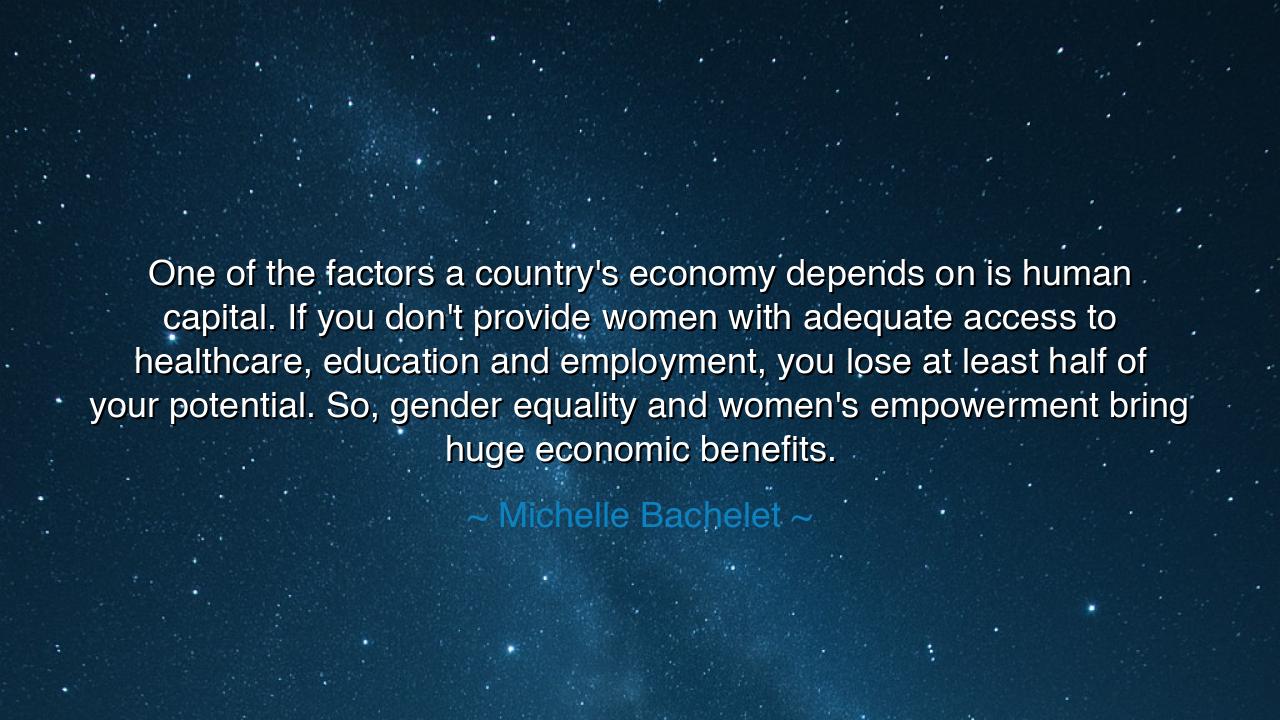
One of the factors a country's economy depends on is human
One of the factors a country's economy depends on is human capital. If you don't provide women with adequate access to healthcare, education and employment, you lose at least half of your potential. So, gender equality and women's empowerment bring huge economic benefits.






Hear the words of Michelle Bachelet, physician, leader, and former president of Chile, who speaks with the voice of wisdom and experience: “One of the factors a country's economy depends on is human capital. If you don't provide women with adequate access to healthcare, education and employment, you lose at least half of your potential. So, gender equality and women's empowerment bring huge economic benefits.” In this declaration she lays bare a truth as ancient as civilization itself: no nation can prosper if it shackles half its people. For a society that silences its women silences its own future, wasting strength, stifling progress, and starving itself of abundance.
The meaning of her words is both practical and prophetic. Nations often speak of wealth in terms of gold, oil, or land, yet Bachelet reminds us that the greatest wealth is human capital—the minds, hands, and hearts of the people. To deny women healthcare is to weaken their bodies. To deny them education is to blind their minds. To deny them work is to bury their talents. Such a nation walks with only one leg, fights with only one arm, sees with only one eye. But to embrace gender equality is to release the full force of its people, doubling its power and multiplying its prosperity.
The origin of this truth lies in both history and Bachelet’s own life. She grew up in a Chile marked by dictatorship and inequality, later rising to become the first female president of her nation. She saw firsthand that women, when empowered with education and opportunity, become not only caretakers of families but builders of nations. Her vision echoes the teachings of ancient wisdom: that a tree cannot bear fruit if half its roots are severed, nor can a country flourish if it denies women their rightful place in its growth.
History offers us a shining mirror in the story of post-war Japan. After the devastation of World War II, Japan rebuilt not only its cities but also its systems of education, extending them to women as never before. Women entered schools, universities, and eventually the workforce in greater numbers. Their contributions, once dismissed, became essential to Japan’s transformation into an economic powerhouse. This was not miracle, but logic: unleash the potential of all your people, and the nation itself will rise.
And yet, Bachelet’s words are not only about wealth, but about justice. For if a society grows rich while leaving its women poor, its prosperity is hollow, built on injustice and imbalance. True empowerment is not charity but fairness—it is the recognition that every citizen, male or female, is born with the right to health, knowledge, and work. To empower women is not merely to enrich the economy; it is to restore the natural order of dignity and equality.
The lesson, then, is clear: if you would see your nation thrive, look not first to your mines or markets, but to your people. Ensure that your daughters, as much as your sons, can study, heal, and labor with dignity. Demand policies that protect healthcare, expand education, and open doors to employment for women. For every barrier removed from a woman’s path is a barrier removed from the nation’s prosperity.
So, children of tomorrow, carry this truth into your lives: the wealth of a nation is not its treasures, but its people. Do not be deceived into thinking progress can be achieved while half of humanity is restrained. Wherever you live, work to empower women, for in doing so you empower families, communities, and nations. As Bachelet has shown, gender equality is not merely a moral cause—it is the key to abundance, strength, and a flourishing future for all.






AAdministratorAdministrator
Welcome, honored guests. Please leave a comment, we will respond soon